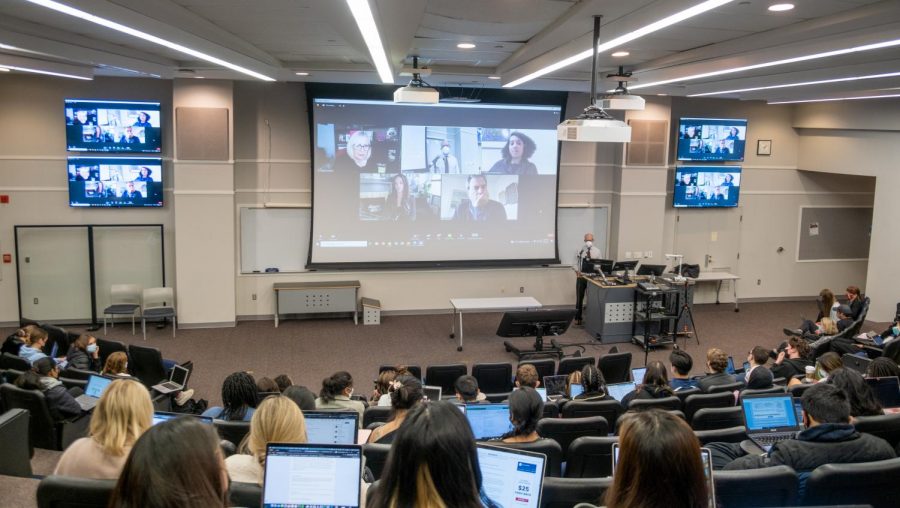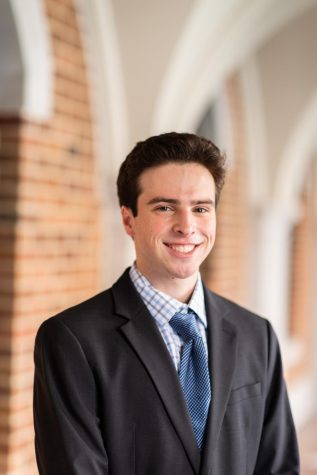MHS 3890-01: Covid and Society is a medicine, health and society (MHS) course introduced during the 2020-21 academic year. Taught by MHS Department Director Dr. Jonathan Metzl, Dr. Celina Callahan-Kapoor and Professor Caroline Randall Williams, the course explores the effects of the COVID-19 pandemic on social justice, the economy, the arts, technology, politics and medicine through interactive discussions and a lineup of world-renowned guest speakers.
Metzl said the overarching theme of the course is pandemic futurism—using facts and data to realistically predict the effects of the pandemic.
“Every week, we take a different topic and ask ourselves: ‘What were things like before the pandemic? What are things like now? And how we can use our expert knowledge to guess how that will change things 10 years from now?’” Metzl said.
Junior Abby Ross, a student in the class, emphasized the importance of learning about the impact the pandemic will have in the years to come, and in the more distant future.
“This class has been super valuable because it encourages me to think about what the future will look like now in the presence of COVID, and how I can best prepare myself to adapt in the place,” Ross said.
Both Metzl and Callahan-Kapoor emphasized the relevance provided by a course like COVID and Society and the insight it brings.
“Having a class for framing our lived experiences and figuring out how to think critically about what’s happening in our world is going to continue to be important, even if the pandemic seems to be in a lull,” Callahan-Kapoor said.
Jeanette Hurwitz, another junior in the class, shared similar thoughts to Metzl and Callahan-Kapoor, stating that the class recognizes the lasting effect the pandemic will have.
“A class like this is really important especially because both the school and administration, especially Diermeier, almost act as if COVID is over, so I enjoy the open dialogue in the class where we express how COVID still affects us,” Hurwitz said. “It’s nice to see professors who care about students and know what we’re going through, so it’s a pretty refreshing course for Vanderbilt students to get the chance to talk without being tested on our discussions.”
The idea for the class was conceived two years ago—at the start of the pandemic—when College of Arts and Science administrators called for more large courses that focused on socially relevant themes.
“All of us [in the MHS department] were already researching the racial inequities that COVID had begun illuminating, so we thought if ever there was a need for a big class that looked at themes relevant to medicine, health and society, then looking at the culture of COVID would be it,” Metzl said.
Throughout the semester, this course was broadcasted twice on Sirius TV, during the weeks of Oct. 18 and Nov. 1. The first broadcasting week consisted of a live television interview with Metzl and students, and the second involved broadcasting both of the week’s lectures for those outside the Vanderbilt community to experience.
The three professors have expertise that adds to the course’s goals. Metzl is a psychiatrist and a sociologist, Callahan-Kapoor is a medical anthropologist and Williams is a creative writer.
“We try to emphasize that there is no one form of expertise; rather, you need different frameworks to understand what’s happening to us right now,” Metzl said.
Among the more notable features of the course, according to Callahan-Kapoor, are the guest speakers that provide insight from a vast range of sectors, including the government, media, the music industry and public health. Recent guests have included Tennessee State Representative John Ragan, NPR’s “The Takeaway” host Melissa Harris-Perry, Honorable Stacey Newman and Grammy award winner Shannon Sanders.
“One of my favorite guest lecturers from last year was Kiese Laymon, a Black American writer who wrote ‘Heavy: An American Memoir,’” Callahan-Kapoor said. “He was amazing to listen to and just brutally honest about his experience as a creative person before and during the pandemic.”
Metzl said that he particularly enjoyed the lectures given by figures in the media earlier this semester.
“During media week, we brought in a bunch of frontline reporters and got to hear what it is like to be a reporter covering COVID-19 news during this time,” Metzl said. “A lot of them were telling us how they received threats just for reporting facts about vaccines and masks because the topics are so political, and I thought that was really fascinating.”
Hurwitz expressed gratitude for having a space to speak about the pandemic. She echoed the professors in saying getting to speak with the guest speakers—and the professors themselves—were a highlight of the course.
“It’s nice to have a dedicated place to talk and mainly complain about COVID with other students, and I appreciate that the class is low stress and relaxing,” Hurwitz said. “The professors themselves teaching it are also all super interesting and have a lot of really cool connections so we get the opportunity to have class speakers from a multitude of disciplines.”
Callahan-Kapoor noted that students have the opportunity to engage in activities other than readings and lectures as well.
“One of my favorite weeks was the one I taught on expertise and authority because, during class, students were able to ask people around campus about who they trusted for COVID information and why,” Callahan-Kapoor said. “When students are able to engage directly with their data, they can take broader themes and concepts and attach them to their own lives, which is really important.”
Though the course was born out of the pandemic, Metzl and Callahan-Kapoor expect it—or a similar course—to become a regular Department of MHS offering.
“The pandemic is changing every aspect of our lives, so personally I think there is going to be a need for a class like this for a number of years to come,” Metzl said.







